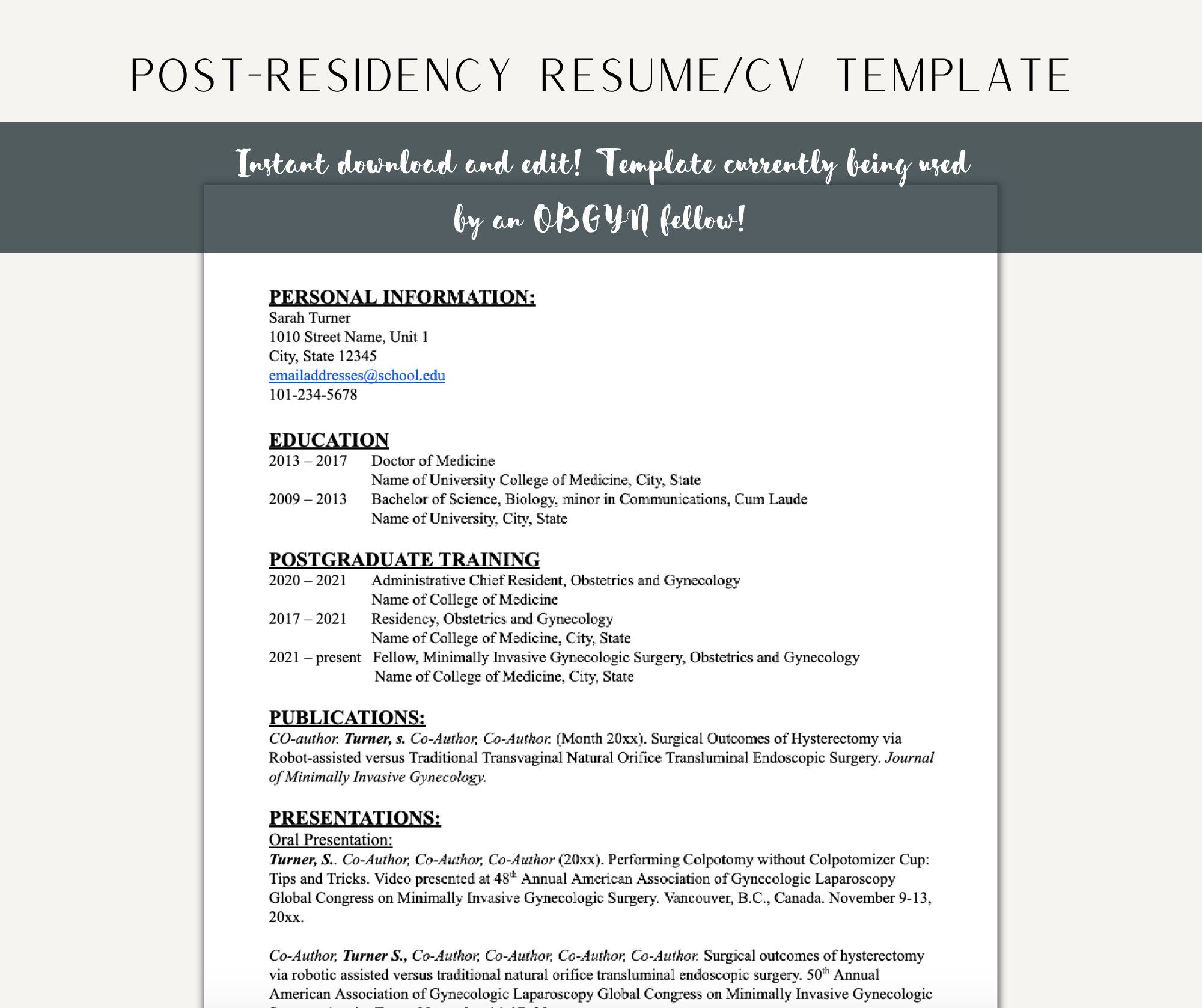Embarking on the journey to secure a residency position is one of the most exciting yet challenging phases in a medical student’s life. Your curriculum vitae, or CV, serves as your primary advocate, a meticulously crafted document that tells your unique story to residency programs. It is far more than just a list of accomplishments; it is a strategic tool designed to highlight your readiness and suitability for the demands of medical training.
Crafting an outstanding CV can feel daunting, especially when you are balancing clinical rotations, research, and application deadlines. That is where understanding the core components and leveraging a well-structured framework becomes invaluable. A strong CV effectively showcases your academic achievements, clinical experiences, research contributions, and personal attributes, painting a comprehensive picture of who you are as a prospective resident.
Structuring Your Standout Residency CV
Creating a compelling CV for your residency application requires careful thought and a strategic approach to organization. The goal is to make it easy for program directors to quickly grasp your qualifications and potential. A logical flow ensures that all your relevant experiences and achievements are presented in a clear and impactful manner, allowing your strengths to shine through without overwhelming the reader. Think of it as guiding them through your professional narrative, highlighting the milestones that have prepared you for residency.
Beyond just listing items, the way you describe each entry truly matters. Use strong action verbs and quantify your achievements whenever possible. Instead of simply stating “Participated in research,” try “Led a team of three students in a prospective study, resulting in a published paper in a peer-reviewed journal.” This approach provides concrete evidence of your skills and contributions, making your experiences much more impactful and memorable to the reviewers. Every section should be tailored to demonstrate your commitment to medicine, your aptitude for learning, and your ability to work effectively within a medical team.
Essential Sections to Include
- Personal Information: Your name, contact details, AAMC ID, and ERAS ID.
- Education: List all undergraduate and medical degrees, institutions, graduation dates, and any honors or distinctions.
- Medical School Performance: Include your medical school GPA or percentile ranking if available and favorable, and any significant awards or scholarships.
- Clinical Experience: Detail all your clinical rotations, clerkships, and externships, including institution, dates, and a brief description of your responsibilities and learning outcomes. Highlight patient interactions and specific procedures or conditions managed.
- Research Experience: Describe any research projects you have been involved in, specifying your role, the institution, and the outcomes such as presentations or publications.
- Publications and Presentations: List all peer-reviewed articles, abstracts, poster presentations, and oral presentations. Use standard citation formats.
- Volunteer Activities and Community Service: Showcase your commitment to service and compassion, describing your roles and contributions.
- Leadership Experience: Any roles where you demonstrated leadership, such as student organizations, committees, or project management.
- Teaching Experience: Mentoring, tutoring, or teaching roles within academic or community settings.
- Awards and Honors: Any academic, research, or service-related awards received.
- Extracurricular Activities: Briefly mention hobbies or interests that showcase well-roundedness, teamwork, or perseverance.
- Professional Memberships: Affiliations with medical associations or societies.
- Language Skills: Proficiency in any languages other than English.
Optimizing Your CV Template for Residency Application Success
Once you have gathered all your information and structured it logically, the next crucial step is to refine and optimize your `cv template for residency application` to ensure it truly stands out. This involves more than just proofreading; it is about strategically positioning your experiences and accomplishments to align with what residency programs are seeking in a candidate. Consider the specific program you are applying to and emphasize the experiences most relevant to that specialty. For instance, if applying to surgery, highlight surgical electives, manual dexterity, or leadership roles that demonstrate your ability to perform under pressure.

Paying meticulous attention to detail is paramount. A single typo or formatting inconsistency can convey a lack of professionalism, which is the last impression you want to make. Ask multiple people, including mentors or career advisors, to review your CV. A fresh pair of eyes can catch errors you might have overlooked and provide valuable feedback on clarity and impact. Remember, your CV is a reflection of your commitment to excellence, not just in medicine but in all aspects of your professional presentation.
The visual presentation of your CV also plays a significant role. While content is king, a clean, organized, and easy-to-read layout ensures that your valuable information is not lost in a cluttered format. Use consistent formatting for dates, titles, and descriptions. Avoid overly ornate fonts or graphics that might distract from your content. Standard, professional fonts like Times New Roman or Arial in a readable size (10-12 point) are generally preferred. White space is your friend; it makes the document less intimidating and easier to skim, which busy program directors will appreciate.
Finally, remember that your CV is a living document. It should evolve as your experiences grow and your career aspirations solidify. Even after submitting your residency applications, continue to update it with any new achievements, publications, or significant experiences. This proactive approach not only keeps your professional record current but also prepares you for future career opportunities, whether in fellowship applications or other professional endeavors. Your CV is a continuous narrative of your journey in medicine.
Your CV is a powerful tool in your residency application, a narrative that introduces you before you ever step into an interview room. By thoughtfully compiling your experiences and meticulously refining their presentation, you are not just listing accomplishments but demonstrating your readiness and passion for a career in medicine. This dedication to detail and strategic presentation can significantly enhance your chances of securing that coveted residency spot.
